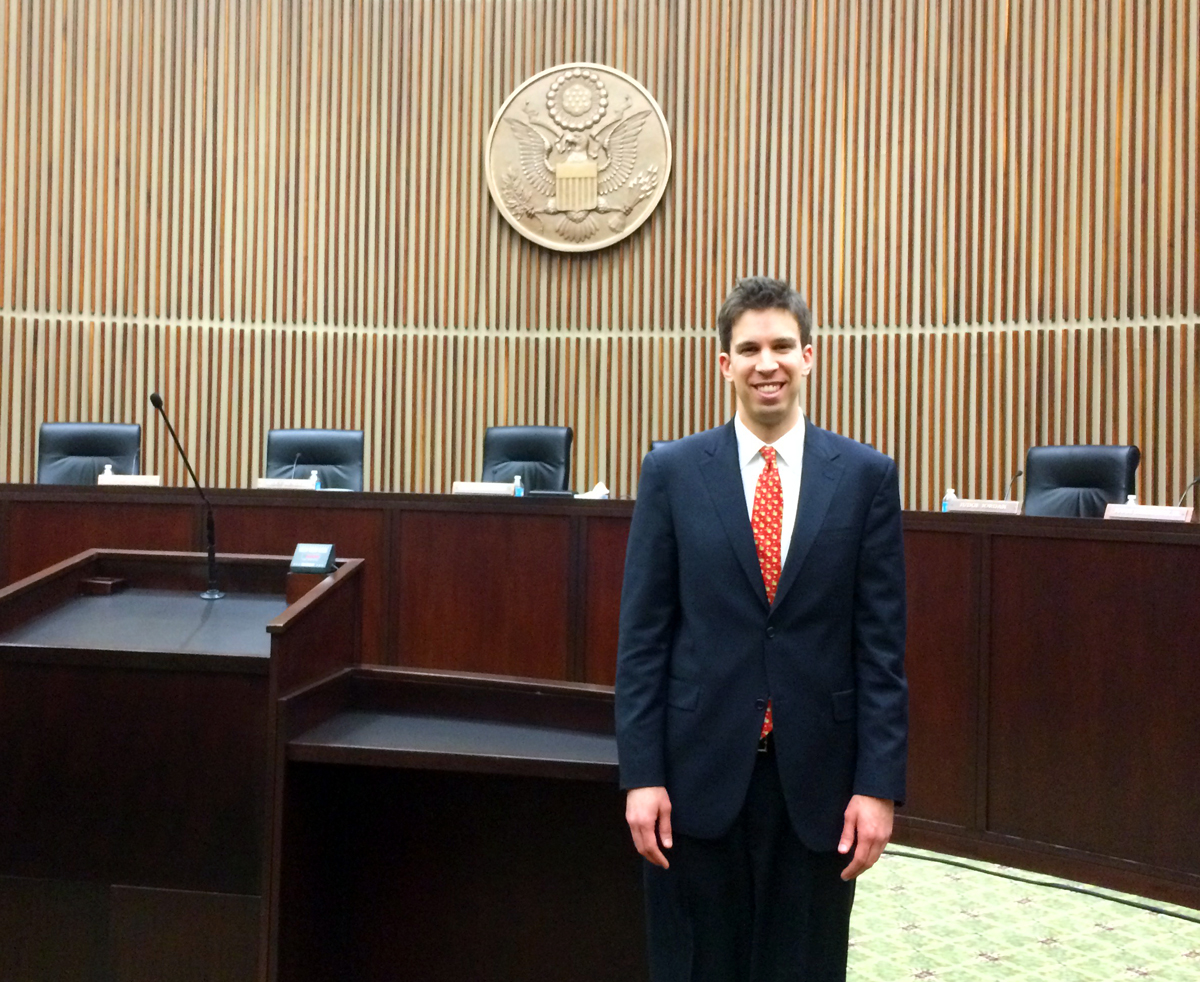Cravath’s New York Office Moves to Two Manhattan West
Pro Bono Appellate Victory in Third Circuit En Banc Criminal Constitutional Rights Case, “United States v. Lewis”
October 05, 2015
On September 16, 2015, the United States Court of Appeals for the Third Circuit, sitting en banc, vacated defendant Jermel Lewis’s criminal sentence and remanded for resentencing in United States v. Lewis. On behalf of Amachi, Inc., a nonprofit organization that tutors children of prisoners, Cravath filed an amicus curiae brief in support of Mr. Lewis and argued before the en banc court.
Mr. Lewis, along with two codefendants, was accused of committing an armed robbery. A federal grand jury indicted Mr. Lewis for robbery in violation of the Hobbs Act and with “using or carrying” a firearm during a crime of violence, in violation of 18 U.S.C. § 924(c)(1)(A)(i). The trial judge instructed the trial jury on the elements of the “using or carrying” offense, and the jury found Mr. Lewis guilty of that offense. The trial court, however, sentenced Mr. Lewis for “brandishing” a firearm during a crime of violence, under 18 U.S.C. § 924(c)(1)(A)(ii), and applied the heightened, seven‑year mandatory‑minimum sentence for “brandishing.” Mr. Lewis objected.
Mr. Lewis and his codefendants raised various issues in a first appeal. In 2012, the Third Circuit affirmed Mr. Lewis’s sentence. Mr. Lewis filed a petition for writ of certiorari. In 2013, the U.S. Supreme Court handed down Alleyne v. United States, 133 S. Ct. 2151, which held that it is an error for a sentencing judge to apply a statutory‑minimum sentence based on judicial fact‑finding where the jury did not find an element necessary to trigger that minimum. In a summary order, the Supreme Court granted Mr. Lewis’s petition, vacated the Third Circuit’s judgment, and remanded to the Third Circuit for further consideration in light of Alleyne. Back in the Third Circuit, Mr. Lewis argued that his sentence should be vacated due to Alleyne error. However, in a two‑to‑one decision, the circuit panel held that the error was harmless because evidence was such that the grand jury and trial jury would have found the aggravating element of “brandishing” had it been presented. Mr. Lewis moved for rehearing en banc, which, in a rare move for the Third Circuit, was granted.
Cravath filed an amicus curiae brief before the Circuit en banc in support of Mr. Lewis. Cravath’s brief explained that the preserved Fifth and Sixth Amendment error of sentencing a defendant for an aggravated crime for which there was no indictment, no trial, no jury instruction and no conviction could not be found harmless for two, distinct reasons. First, Cravath argued that the error was a pure sentencing error that could have affected the length of Mr. Lewis’s sentence. Second, Cravath argued that the error was a structural error that constructively amended Mr. Lewis’s indictment.
After Cravath submitted its brief, the en banc court sua sponte invited Cravath to participate in oral argument. On February 19, 2015, associate Michael P. Addis argued before the Third Circuit en banc.
Ten of the thirteen en banc judges decided to vacate Mr. Lewis’s sentence and remand for resentencing. Judge Rendell’s lead opinion followed the analysis set forth in Cravath’s first argument that the error was a pure sentencing error that was not harmless due to its potential effect on sentence length. Judge Rendell expressly refrained from reaching Cravath’s second structural error argument. Judge Smith’s concurring opinion, joined by three other judges, agreed with Cravath’s second argument that the error was structural and, therefore, reversible. The three‑judge dissenting opinion, authored and joined by the two judges whose panel opinion had been vacated by the en banc court, asserted that “[t]he plurality bases its ultimate decision on the rationale introduced by amicus curiae.”
In addition to Mike Addis, the Cravath team included partner J. Wesley Earnhardt and associate Michael D. Schwartz.

Pictured above, litigation associate Michael P. Addis of Cravath, Swaine & Moore LLP at the Third Circuit.
Related Practices & Industries
People
-
J.D., 2004, University of North Carolina School of Law
-
B.A., 2000, University of North Carolina at Chapel HillPhi Beta Kappa
- New York
Education
Admitted In
-
J.D., 2010, Harvard Law School
-
M.S.T., 2007, Pace University
-
A.B., 2005, Princeton Universitymagna cum laude
- New York
Education
Admitted In
Related News
Deals & Cases
October 10, 2024
Cravath Secures Win for Asylum Seekers from Russia
On August 8, 2024, U.S. Citizenship and Immigration Services (USCIS) granted asylum to two Cravath pro bono clients, a gay couple from Russia who suffered violence and persecution based on their sexual orientation.
Deals & Cases
August 28, 2024
Cravath and A Better Childhood Win Class Certification for Children in NYC Foster Care, Advancing Longstanding Litigation
On August 23, 2024, the U.S. District Court for the Southern District of New York ruled that 19 children in a longstanding lawsuit could proceed as a class representing all children in the New York City foster care system, an important milestone for plaintiffs represented by Cravath on a pro bono basis alongside co‑counsel at A Better Childhood (“ABC”). Judge Kimba Wood issued the decision after the Second Circuit Court of Appeals reversed a prior ruling denying class certification in September 2023.
Deals & Cases
February 22, 2024
New York State Appellate Division Reverses Wrongful Criminal Conviction Resulting from Consolidated Indictments
On February 13, 2024, the New York State Appellate Division, First Department, reversed the convictions of Tommy Davis, who was simultaneously prosecuted for two unrelated incidents involving firearms. Cravath represented Mr. Davis on a pro bono basis alongside co‑counsel at the Office of the Appellate Defender.
Deals & Cases
December 28, 2023
Cravath’s Incarcerated Survivors Initiative Secures Release of Domestic Abuse Survivor
On November 28, 2023, the Queens County Criminal Court entered an order on consent resentencing pro bono client A.M. and securing her release. A.M. had been incarcerated since June 2010. She was originally sentenced in June 2011, pursuant to a plea agreement, to a 20‑year determinate sentence plus five years’ post‑release supervision for first‑degree manslaughter after her romantic partner, who had subjected her to severe domestic abuse, killed her former partner, who had sex trafficked her and also subjected her to severe domestic abuse.
Cravath Bicentennial
Celebrating 200 years of partnership. In 2019, we celebrated our bicentennial. Our history mirrors that of our nation. Integral to our story is our culture.
Attorney Advertising. ©2025 Cravath, Swaine & Moore LLP.



